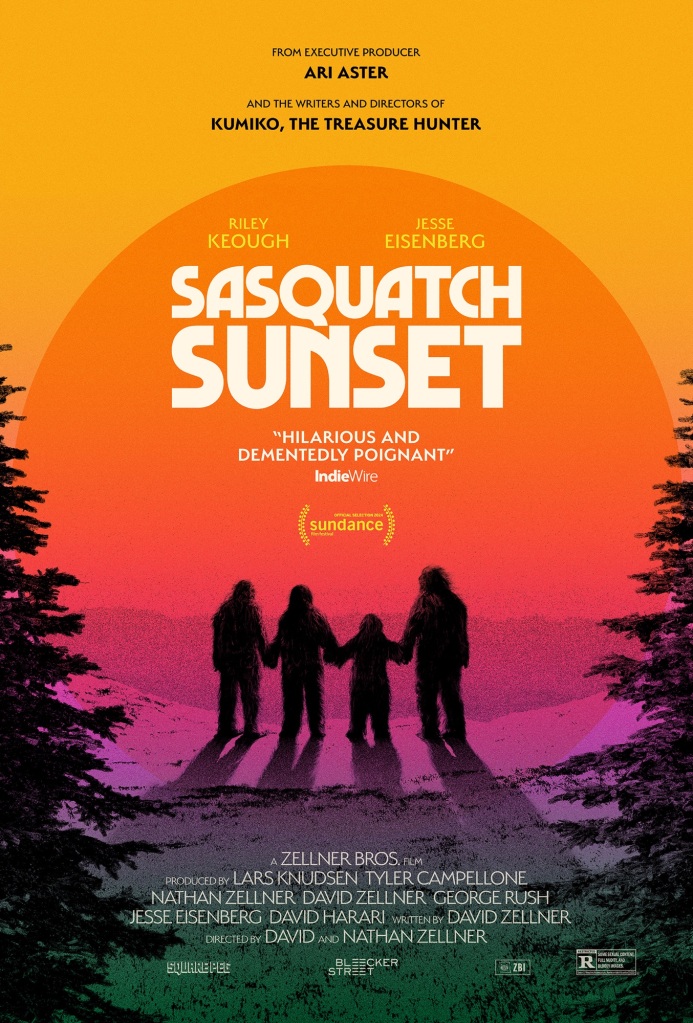
This film opens with vast mountain scenery that represents a form of surreal solitude—the presentation looks and feels peaceful and rejuvenating. Then the film jumps to a family that is obscure—a family of sasquatch creatures. The creativity of Sasquatch Sunset is unique and fearless—the film itself feels like uncharted territory. However, I felt sold on it for the first thirty minutes, and then later I felt there were multiple blurred lines in the continuation of the film itself. Directed by David and Nathan Zellner, their attempt to create a strong form of portraying a unique environment is almost accomplished, but the line of continuity just continues to be halting.
The film is about a family of sasquatches, and they have no names. The celebrities as the sasquatches are Jesse Eisenberg, Riley Keough, Chrisotpher Zajac-Denek, and Nathan Zellner. The focus is on the life of this sasquatch family in the forest over the many different seasons. Nature takes its course to a heavy extent. There is no dialogue though, only repeated grunts, gibbers, and all kinds of animal sound effects. All of which give a pretty clear understanding though, as one of the beginning moments is where two of the sasquatch creatures engage in having a sensual moment. That scene gives off the feeling that Sasquatch Sunset could be decent, neutral, or mediocre.
With all the nature vibing, the life of the sasquatch family in Sasquatch Sunset has no clear point to give the film continuity. I felt that it was like a lighthearted version of a Planet of the Apesflick…there are just no humans or spoken language whatsoever. Its scoring and use of music is what creates the euphoric and somewhat inspiring atmosphere. The sasquatch family gets hyperactive and enthusiastic with the resources of their forest—turtles, plants, and drenches are where their positivity thrives. They may not be able to speak, but their facial expressions are their key to understanding their forms of communication for the film’s audience. How does this bizarre family of creatures find their connection? What are its writers trying to accomplish? Is their home in the forest their center of massive conflict?
My mind kept swerving back and forth with Sasquatch Sunsetcreating a blur. I thought to myself that the territory is clearly one that is taken and making the sasquatch family feel violated. If that was the case, why does the film resort to so much grunting and crazy buffoonery. “Buffoonery” in terms of how they act when they are not pleased. A lot of which I do not intend to describe, as it is on the side of grotesque. However, if the audience likes what is twisted, then they will get their money’s worth of “gross” in Sasquatch Sunset. I will say that the many behaviors made me have a clear understanding of the reasons why this film had people walking out at the Sundance Film Festival this year. It is clear this was not everyone’s cup of tea. It may be for some, but not so much for me. I will say though, I give this one credit for its different idea even though it did not find the right path of execution.
There is a moment where the sasquatch family comes across a tree and that sets off curiosity—a major layer of “curiosity” because the sasquatch family just starts eating from the tree. Then there is another tree found, and one of the sasquatches despises the taste of that second tree—animal instincts are clear and descriptive of what the underlying turmoil can be in Sasquatch Sunset. After they eat from a bad tree, there is a bizarre eagerness, how an animal would react if they were overly-excited. They do not speak, but they grunt and cheer on a bonkers level.
This is a ninety-minute nature escape with suspense in the craziest matter and repulsive to the extreme. Its writing makes its viewers think of nature along with the creatures (who roam like animals). From this setup, I felt like there would be more surreal tones of connection and a unique-type feeling. I thought of films like Where the Wild Things Are, March of the Penguins, and Jumanji—films of creatures, animals, or humans finding a course of action in an unknown territory. There is that setup of trying to find peace for the odd sasquatch family in Sasquatch Sunset, yet its presentation is just scattered and quirky.
This habitat that is natural for the sasquatch family is not so much for the rest of its audience. The big question…where is nature going? Especially with a moment of the sasquatches coming across a boom box and going into a mental state of craziness. I was rattling my head thinking maybe it was haunted. The forms of the forest seem to be haunted by layers of normalcy…the building blocks of nature are not part of the clever process of the film’s continuity…it makes for a below average portrayal in Sasquatch Sunset. Is there a point? Is there a layer of importance I was missing? Where is the narrative or poetic vibe in this film? I had a hard time seeing it. I do credit the film for its heavy direction in unforgettable scenery though. Two out of four stars for Sasquatch Sunset.

